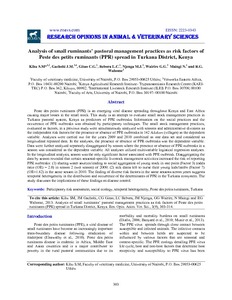Resource information
Peste des petits ruminants (PPR) is an emerging viral disease spreading throughout Kenya and East Africa causing major losses in the small stock. This study is an attempt to evaluate small stock management practices in Turkana pastoral system, Kenya as predictors of PPR outbreaks. Information on the social practices and the occurrence of PPR outbreaks was obtained by participatory techniques. The small stock management practices, evaluated as factors, in a previous study were simultaneously analyzed with seasons and administrative divisions as the independent risk factors for the presence or absence of PPR outbreaks in 142 Adakars (villages) as the dependent variable. Analyses were carried out for the years 2009 and 2010 combined as one data set and considered as longitudinal repeated data. In the analyses, the presence or absence of PPR outbreaks was the dependent variable. Data were further analyzed separately disaggregated by season where the presence or absence of PPR outbreaks in a season was considered as the dependent variable. All analyses utilized multivariable logistical regression analyses. In the longitudinal analysis, season was the only significant factor associated with PPR outbreak. Disaggregating the data by season revealed that certain seasonal-specific livestock management activities increased the risk of reporting PPR outbreaks: (1) sharing water sources leading to social aggregation of young stock in one point (Factor 3) (odds ratio (OR) = 2.0) in season 2 (wet season) of 2009; (2) sick dams left to nurse their young kids/lambs (Factor 7) (OR=1.62) in the same season in 2010. The finding of diverse risk factors in the same seasons across years suggests temporal heterogeneity in the distribution and occurrence of the determinants of PPR in the Turkana ecosystem. The study discusses the implications of these findings on disease control.


